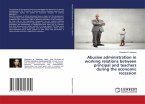Traditionally, administration of higher education is a male-dominated. Women have fought to improve their own lives. This study examined senior women leaders in higher education administration in the United States of America. It explored factors influencing women to attain leadership positions. It also looked at the challenges facing female leaders and established strategies women use to overcome these challenges. A sample of 11 women leaders in higher education selected based on experience, seniority and roles. Interviewing, observation and document analysis were utilized for data collection. The qualitative phenomenological method was utilized to organize and analyze the data. The data was collected from primary and secondary sources. Findings reveal that senior women leaders are intrinsically moved by a desire to make positive difference and a need to help others. Forces influencing women to leadership include achievement, mentoring, training, networks, prior experience. Obstacles include institutional structures, rules, school conditions, lack of support, skills. Optimistic, a positive attitude, planning, mentorship, efficacy, and support are vital to women leaders' success.
Hinweis: Dieser Artikel kann nur an eine deutsche Lieferadresse ausgeliefert werden.
Hinweis: Dieser Artikel kann nur an eine deutsche Lieferadresse ausgeliefert werden.








